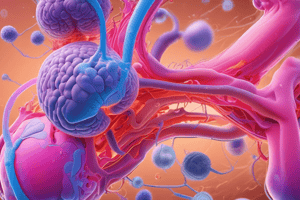Podcast
Questions and Answers
What process in the nephron is primarily affected in the condition of proteinuria, and why?
What process in the nephron is primarily affected in the condition of proteinuria, and why?
The filtration process in the glomerulus is primarily affected because it allows protein to pass through its filters, which should normally restrict large molecules.
How does glomerular damage contribute to the symptoms of proteinuria?
How does glomerular damage contribute to the symptoms of proteinuria?
Glomerular damage increases permeability, allowing proteins such as albumin to leak into the urine, which indicates kidney dysfunction.
Why is proteinuria considered a significant clinical finding?
Why is proteinuria considered a significant clinical finding?
Proteinuria is significant because it indicates potential kidney damage or disease, which can lead to serious health complications.
What role does the renal tubule play in the context of proteinuria?
What role does the renal tubule play in the context of proteinuria?
How can conditions leading to increased blood pressure affect protein levels in urine?
How can conditions leading to increased blood pressure affect protein levels in urine?
Flashcards
Glomerular Filtration
Glomerular Filtration
The process where blood is filtered in the nephron, removing waste products and excess water.
Proteinuria
Proteinuria
The presence of excessive protein in the urine.
Nephron
Nephron
The filtering unit of the kidney responsible for removing waste from blood.
Glomerulus
Glomerulus
Signup and view all the flashcards
Glomerular Damage
Glomerular Damage
Signup and view all the flashcards
Study Notes
Glomerular Filtration
- The glomerulus, a network of capillaries in the nephron, is responsible for filtering blood.
- It filters blood plasma, allowing small molecules like water, glucose, amino acids, and waste products to pass through into Bowman's capsule.
- However, larger molecules like proteins, blood cells, and platelets are normally retained within the capillaries due to the filtration membrane's selective permeability.
Filtration Membrane
- This membrane is a crucial component of the glomerulus, composed of three layers:
- Endothelial cells: Fenestrations (pores) in these cells allow for efficient filtration.
- Basement membrane: A negatively charged filter acting a barrier preventing passage of large proteins.
- Podocytes: Specialized epithelial cells with foot processes creating filtration slits, further restricting the passage of larger molecules.
Impaired Filtration
- Proteinuria can arise from damage or dysfunction in one or more of the filtration membrane structures.
- Alteration of the filtration membrane’s structure or charge can disrupt its ability to prevent sufficient filtering of proteins, allowing them to enter the filtrate within Bowman's capsule.
Potential Causes of Proteinuria (related to nephron)
-
Damage to the glomerular capillaries: This damage can be due to various factors, including
- Glomerulonephritis: Inflammation of the glomeruli, often caused by immune responses. This inflammation can alter the glomerulus's structure and charge.
- Hypertension: High blood pressure can cause damage to the fragile capillaries in the glomerulus.
- Diabetic nephropathy: Long-standing diabetes can damage the glomerulus leading to progressive scarring and structural alterations.
-
Changes in the glomerular basement membrane charge: An alteration in negative charge, reducing the repulsion of negatively charged proteins, can allow proteins to pass through, causing proteinuria.
-
Injury to the podocytes: Podocyte damage can occur from many of the factors listed above. Their foot processes are delicate; injury or detachment leads to an increased permeability to proteins, resulting in proteinuria.
Conclusion
- Proteinuria is primarily associated with impairment of the glomerulus's filtration function.
- Damage to the glomerular capillaries, alteration in the glomerular basement membrane, or injury to the podocytes are mechanisms by which protein filtration can be disrupted leading to proteinuria.
- These impairments allow proteins normally retained in the blood to pass into the urine.
Studying That Suits You
Use AI to generate personalized quizzes and flashcards to suit your learning preferences.




